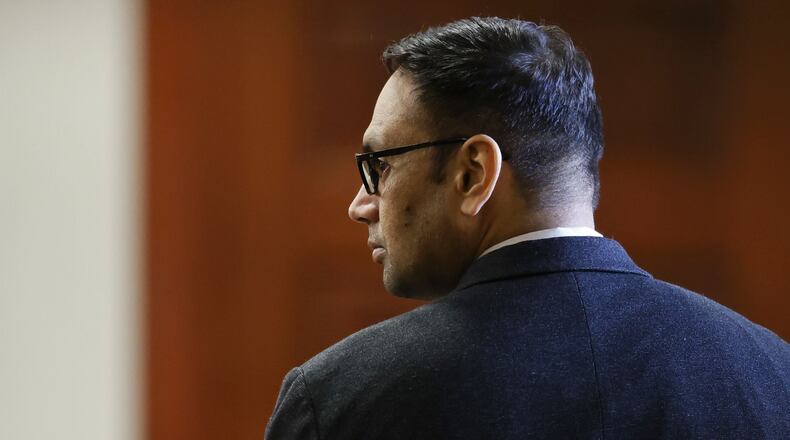Court will resume at 8:30 a.m. Friday.
Singh, a 40-year-old former truck driver, is charged with four counts of aggravated murder for allegedly shooting and killing his wife Shalinderjit Kaur, 39; his in-laws, Hakikat Singh Pannag, 59, and Parmjit Kaur, 62; and his aunt-in-law, Amarjit Kaur, 58, at a West Chester Twp. apartment on April 28, 2019.
Earlier in the week, the prosecution rested Monday and the defense rested Wednesday after calling one witness, a blood spatter expert. Singh did not take the stand.
Prosecutors said Singh murdered his family by shooting them all in the head after a longtime affair he was having and a strained relationship with his in-laws over money from land owned in India.
The defense said Singh is innocent and the killings were part of a professional hit due to Pannag’s financial woes and a dubious land contract deal in India with the “land mafia.” They say three masked men broke into the apartment with baseball bats and Singh ran for his life. When he returned, everyone was dead.
Christopher Robinson, formerly employed by the Georgia Bureau of Criminal Investigation, was the defense’s only witness. Robinson testified he believes it would be impossible for the shooter not to have the DNA from all victims on him because of the close range of the shootings. Singh only had blood from his wife on his clothes and hands.
Robinson also testified the gunshot residue on Singh’s hands could have been transferred from his dead wife, who he said he hugged after she had been killed.
Prosecutors questioned Robinson’s qualifications, noting he had been terminated from a job in Atlanta and his analysis had been questioned on some cases, with others having to retest his work.
During closing arguments that lasted about two hours, prosecutors pointed to a mass of circumstantial evidence that mounted up against Singh.
“Money, sex, murder — this case has it all.” said Assistant Prosecutor Josh Muennich.
“This is a story about someone who has a reason to hate that family,” Muennich told the jury during closing arguments. Money and other valuables were left in the apartment: “This was not a burglary or a robbery,” he said. “You can tell by the injuries that the person who did this hated them.”
Muennich said the murders came at a time when Singh’s marriage was unraveling, he was spending thousands on his mistress and he felt entitled to the money from land his father-in-law owned in India.
Hakikat, who was sleeping in his bed, was shot first, then Singh walked through the apartment from front to back, shooting his wife, his mother-in-law and aunt-in-law in the head, Muennich told the jury. All were shot from behind, the evidence shows, not from the front that would be consistent with an intruder entering and opening fire, Muennich said.
Then Singh lied to police about the his affair, his strained relationship with his father-in-law and never mentioned any armed intruders, Muennich said.
“One gun, 16 shell casings and 16 holes in people, Muennich sid. “There was only one shooter.”
The GPS from Singh’s car and cell phone puts him inside the apartment at 9:11 p.m. He did not call 911 until 29 minutes later and when he did, Singh told the dispatcher, “I just got home.”
There was a gun in the bedroom, but after allegedly finding his family murdered, Singh did not arm himself with that gun, Muennich noted.
“They were alive until he (Singh) got home,” Assistant Butler County Prosecutor Jon Marshall told the jury. Singh was in the apartment at 9:11 p.m., witnesses heard gun shots between 9:15 and 9:30 p.m. and Singh did not call 911 until 9:40 p.m.
In closings, defense attorney Charlie Rittgers schooled the jury on reasonable doubt, stating the Ruger handgun used in the murders cannot be tied to Singh and there was no blood or DNA on Singh from three of the victims.
Rittgers said “absolutely” there was a land dispute that had been ongoing with people who had something to gain from Hakikat’s death.
The defense said of the more the 20 phones investigated, there was no mention of a plot to kill the family. Rittgers said Singh did delete messages from his mistress because he didn’t want his wife to find them.
“They are resting their case on the fact that Gurpreet was not completely open and honest with police,” Rittgers said.
About the Author



